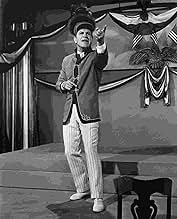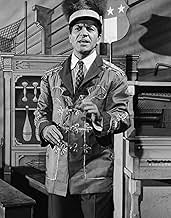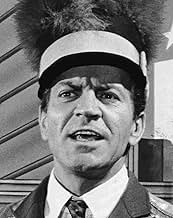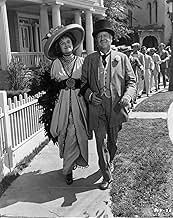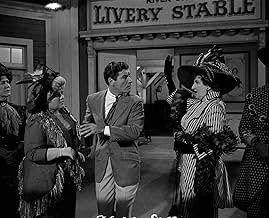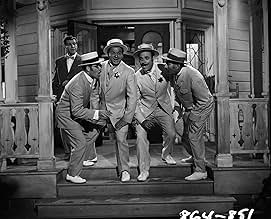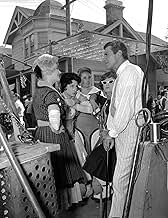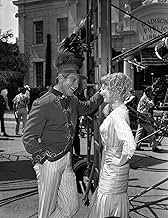Ajouter une intrigue dans votre langueTraveling con artist Harold Hill targets the naïve residents of a small town in 1910s Iowa by posing as a boys' band leader to raise money before he can skip town.Traveling con artist Harold Hill targets the naïve residents of a small town in 1910s Iowa by posing as a boys' band leader to raise money before he can skip town.Traveling con artist Harold Hill targets the naïve residents of a small town in 1910s Iowa by posing as a boys' band leader to raise money before he can skip town.
- Réalisation
- Scénario
- Casting principal
- Récompensé par 1 Oscar
- 6 victoires et 12 nominations au total
- Jacey Squires
- (as The Buffalo Bills)
- Winthrop Paroo
- (as Ronny Howard)
- Ewart Dunlop
- (as The Buffalo Bills)
- Olin Britt
- (as The Buffalo Bills)
- Oliver Hix
- (as The Buffalo Bills)
Avis à la une
When he jumps train in River City to escape the wrath of an angry gathering of his peers, whom he has `Given a black eye' to in the territory, thanks to his dubious business practices, he sets about plying his trade on the good folks of middle America. But right out of the chute, he runs into some problems: The Mayor of River City, George Shinn (Paul Ford) wants his credentials, the lovely young local piano teacher and librarian, Marion (Shirley Jones), has her doubts about him, and he lacks an `angle,' something to convince the local citizenry of the need for a `boys band' to get them out of the trouble they're in-- even if there isn't any until he `creates' it.
One of his problems is solved when he runs into Marcellus Washburn (Buddy Hackett), a former shill of his, who mentions the new billiard table that just arrived in town. And that's all the Professor needs; because now they've got trouble, `With a capital T' that rhymes with P' and that stands for Pool'!' With that, he's up and running and he's got everything timed, right down to the `Last wave of the conductor's hand on the last train out of town.' Yee-gods and great honk! River City, Iowa, is about to have their very own boy's band.
Robert Preston gives the most memorable performance of his career as Hill, the silver-tongued salesman who can palaver past postulated proffered predicaments quicker'n an eggheaded egret's emblematized egression. It's just a matter of charm, style and timing, and Preston imbues Hill with em all, and more. He brings a mesmerizing presence to the screen in this role that is absolutely perfect; Preston IS Harold Hill, and he makes him his own in such a way that it's impossible to visualize anyone else in the role. It certainly gave Preston a chance to demonstrate his amazing versatility, and he really made the most of it, carving out a niche for himself in cinematic history.
The beautiful and talented Shirley Jones is terrific, as well, as `Marion the Librarian,' the young woman with a heart of gold who becomes a formidable opponent for Hill as he tries to charm his way past her suspicions of him. Jones personifies everything that is pure, moral and good, without being prudish, and it makes Marion a truly endearing character. And, like Preston, her performance is so good it's impossible to picture anyone else in the part. She's simply magnificent.
The made-to-order supporting cast includes a very young Ron Howard, unforgettable as Winthrop Paroo, Marion's little brother, Hermione Gingold (Eulalie Mackechnie Shinn), Pert Kelton (Mrs. Paroo), Monique Vermont (Amaryllis), Susan Luckey (Zaneeta), Timmy Everett (Tommy Djilas), Harry Hickox (Charlie) and Mary Wickes (Mrs. Squires). Featuring a number of memorable songs, including `76 Trombones,' `Till There Was You,' `Gary, Indiana' and of course the catchy `Trouble In River City' number, `The Music Man' is an uplifting, totally transporting film that makes the world seem like a pretty good place after all. This is the `Good Old Days' the way we'd like to think they really were, and it's all courtesy of the magic of the movies. I rate this one 10/10.
The director Morton DaCosta uses a gimmick here and in Auntie Mame that I don't care for. At the end of some scenes, all the lights go out except those on the principals. Sometimes that's more of a jolt than necessary, because we've gone from outdoors to inside the studio.
My favorite song is Sadder But Wiser Girl. The reference to Hester winning just one more A meant nothing until 11th grade when we read The Scarlet Letter. And after Preston sings that line, he looks guiltily over his shoulder at Amaryllis to see if she understands how naughty he's been.
My second favorite is Lida Rose/Will I Ever Tell You. Such a beautiful song. It pains me that the rocking chairs at either end of the screen are sometimes out of sync. It should have been done perfectly.
One brilliant touch concerns the Buffalo Bills. Early on, Mayor Shinn says "The members of the School Board will not present a patriotic tableau. Some disagreement about costumes, I suppose." At the time, the four are dressed quite differently. As their singing progresses, they start dressing more and more alike, until at the end they're dressed alike (I'm pretty sure).
Marion's epiphany during The Wells Fargo Wagon is quite sweet.
As is a lovely line from Goodnight, My Someone: But I must depend on a wish and a star/ As long as my heart doesn't know who you are. (Sigh.)
Its splendors have already been mentioned. I add two minor treats: 1) appearance of lanky character actor Hank Worden (of "The Searchers" and "Twin Peaks") as the undertaker, and 2) script so full of bizarre slang and expressions, it's as if P.G. Wodehouse or Damon Runyan were writing turn-of-the-century Americana.
My two carps are minor: I would have told Morton Da Costa to lose all the heavy-handed cutaways to the train wheels ("Rock Island") and chickens ("Pick a Little, Talk a Little") because we already got the point, and Ron Howard's cute lithp is a turn-off for me, but I never like cute kids. However, he's good at the climax, and when Shirley Jones hears him singing "Wells Fargo Wagon" and tears the evidence against Harold Hill out of the book (a librarian!), it's one of the most convincing turnarounds in musical history. Especially because she's still not fooled by the hucksterism, she just perceives it differently in comparison with the easily manipulated small-towners around her. She realizes that he's selling hope and joy despite himself ("There's always a band.") And when she just thanks him for his gift ("Till There Was You") and doesn't mind if he flees, of course he realizes he would be insane to leave. Another heartfelt turnaround.
One of the most graceful musicals, marked by blurring of the line between straight dialogue and songs--as the line "there was love all around but I never heard it singing" implies, you can hear the singing if you listen for it in the world. It's in the trains and the chickens and the bands you hear in your head and the pride in your children playing that clarinet by the "think system." Moving.
This movie has it all - wonderful music, a fine script, good production values and a top cast. What makes it really special is Robert Preston's tour-de-force performance. His performance is, quite simply, one of the most memorably great performances in the history of film.
It's one of those benchmark performances that must make any other actor who takes the role shake in their boots, for as long as the memory of Robert Preston as Prof. Hill exists all others will be compared against him and, likely, found lacking.
The rest of the cast is superior. I especially love Pert Kelton as Marian the Librarian's mother. Kelton was the original Alice on the classic "The Honeymooners" (she played Alice's mother later on in the series) and she had incredible comic timing. She reminds me of a combination of Ethel Merman, with her brassy voice and larger-than-life presence, and the comic genius of the great Patsy Kelly. It's a shame Kelton was not put to better use in the movies. She was a natural.
And then there is Shirley Jones. Lovely to look at and wonderful to hear and a good enough actor to keep up with Preston.
Buddy Hackett usually annoyed me but he's perfect as Prof. Hill's sidekick and his "Shafoofie" (sp?) number is a blast.
Funniest scene - Grecian Urns.
A splendid movie and one of the last great musicals. They truly don't make 'em like that anymore.
Jones as the lovely but doubting 'Marian the Librarian', Pert Kelton as her mother, Buddy Hackett as his fine friend, Paul Ford and Hermione Gingold as the pretentious Mayor and his wife, plus many citizens of the town young and old, Harry Hickox as the envious rival who exposes Hill and the Buffalo Bills singing quartet. Well-known songs in this sprightly US romp include, "Till There Was You", "Somethin' Special", "Goodnight My Someone", "Marian the Librarian" and "Trouble", among others. In the film, the leads are award caliber, everyone else from Ronnie Howard to Susan Luckey to the quartet do very well. Marion Hargrove adapted Wilson's libretto and songs written by Wilson and Franklin Lacey. The cinematography by Robert Burks was vivid and stylishly old-fashioned. Paul Groesse did the art direction, with set decorations being supplied by George James Hopkins and his staff. The very elaborate costumes were the work of the brilliant designer Dorothy Jeakins. This is a sense of life film written by, about and for non-practicing Christians of the last century that was mounted somehow in 1962, as an homage to a simpler and more optimistic time. We can all be grateful it was; it is a great deal of fun and its ending is a happy part of the fantasy, which needs to be seen to be appreciated.
Le saviez-vous
- AnecdotesThe two songs "76 Trombones" and "Good Night My Someone" are the same tune, played in different tempos. Meredith Willson used this technique to present a masculine and feminine slant on the events surrounding Harold Hill's arrival in River City and his budding relationship with Marian.
- GaffesAs Harold makes his very first walk down Main Street after getting off the train, the hills in the background are at the far eastern end of the Santa Monica Mountains. Iowa is famously flat.
- Citations
Marian Paroo: No, please, not tonight. Maybe tomorrow.
Harold Hill: Oh, my dear little librarian. You pile up enough tomorrows, and you'll find you've collected nothing but a lot of empty yesterdays. I don't know about you, but I'd like to make today worth remembering.
Marian Paroo: Oh, so would I.
- Crédits fousThe closing credits appear in the style of a Broadway show's curtain call. First the minor characters are shown with the performers' names. The credits then progress through the cast ending with the lead.
- Bandes originalesMain Title
(1957) (uncredited)
Music and Lyrics by Meredith Willson
Performed by Ray Heindorf and the Warner Bros. Studio Orchestra
Meilleurs choix
Détails
- Date de sortie
- Pays d’origine
- Langue
- Aussi connu sous le nom de
- Vendedor de ilusiones
- Lieux de tournage
- Société de production
- Voir plus de crédits d'entreprise sur IMDbPro
Box-office
- Budget
- 4 240 000 $US (estimé)
- Durée2 heures 31 minutes
- Couleur
- Rapport de forme
- 2.35 : 1
Contribuer à cette page



